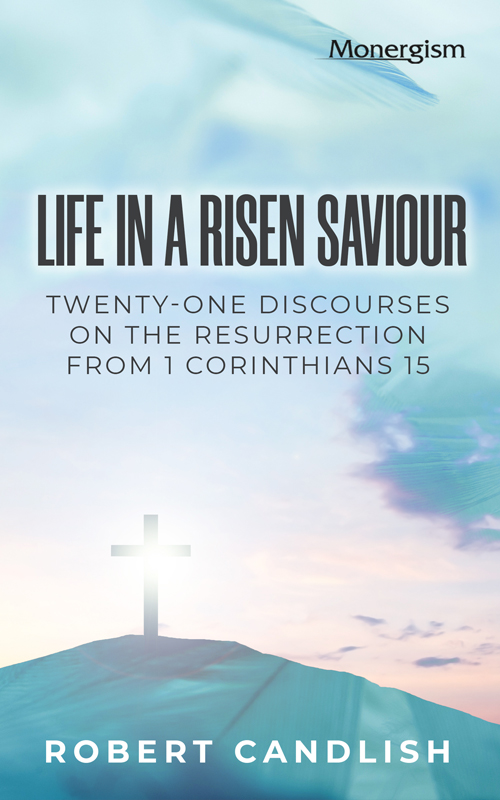 by Robert Candlish'
by Robert Candlish'
in ePub, .mobi & .pdf formats
Twenty-one Discourses on the Resurrection from 1 Corinthians 15
I HAVE endeavoured, in these Discourses, to illustrate the line of argument pursued by the Apostle. It is not, as I apprehend it, an argument about the resurrection generally. It has respect to one particular view of the resurrection; its bearing on the believer's spiritual and eternal life. I have sought to trace the line of thought which gives unity and coherence to the Apostle's reasoning. I have by no means, however, aimed at anything like a complete commentary or exposition. I have rarely discussed different interpretations, and have abstained from minute criticism. There is no attempt, on my part, to occupy the place already so well filled by such learned and acute scholars as Dr. John Brown, and other recent writers, who have bestowed research and study on the examination of this portion of Scripture. I have not quoted authorities. But I must name Isaac Taylor's "Physical Theory of Another Life," as having suggested interesting lines of thought connected with the future state.
I crave indulgence for some diffuseness, as well as for occasional repetitions, not easily to be avoided in a series of compositions for the pulpit, prepared often hastily from week to week, and all having reference, more or less directly, to one theme. I might have recast what I had thus prepared, so as to give it the form of a more compact treatise. But that is always an irksome task,—and not always a successful one. I have thought it best to publish the Discourses very much as they were when I preached them.
-----
TABLE OF CONTENTS
PREFACE
DISCOURSE I. 1 Corinthians, 15:1, 2.—The consistency of Paul's preaching, and its acceptableness
DISCOURSE II. 1 Corinthians 15:3–11.—The substance of Paul's preaching, and its evidence
DISCOURSE III. 1 Corinthians 15:12–17.—If there is no resurrection, Christ is not risen, and we are yet in our sins
DISCOURSE IV. 1 Corinthians 15:18, 19.—The pious dead are lost, and we are miserable
DISCOURSE V. 1 Corinthians 15:20–23.—But Christ is risen, and is become the first-fruits of them that sleep
DISCOURSE VI. 1 Corinthians 15:24–28.—The end; the delivering up of the kingdom to the Father
DISCOURSE VII. 1 Corinthians 15:29–32.—Why baptism for the dead, and other hazards? Why not live for the passing day?
DISCOURSE VIII. 1 Corinthians 15:33, 34.—Danger of Antinomian license, as the fruit of dallying with "profane and vain babblings."—(2 Tim. ii. 16–18.)
DISCOURSE IX. 1 Corinthians 15:35–38.—How are the dead raised?—Not as they die—Analogy of the bare grain yielding ripe fruit
DISCOURSE X. 1 Corinthians 15:39–42.—Varieties of bodies in nature—Terrestrial and celestial
DISCOURSE XI. 1 Corinthians 15:42–44.—Bodies changed from corruption, dishonour, and weakness, to incorruption, glory, and power
DISCOURSE XII. 1 Corinthians 15:44.—The natural and the spiritual body
DISCOURSE XIII. 1 Corinthians 15:45–49.—The two Adams
DISCOURSE XIV. 1 Corinthians 15:50–53.—"Flesh and blood cannot inherit the kingdom of God"
DISCOURSE XV. 1 Corinthians 15:53, 54.—"Flesh and bones"—Kinsmanship, and community of nature
DISCOURSE XVI. 1 Corinthians 15:54—Death swallowed up in victory
DISCOURSE XVII. 1 Corinthians 15:55, 56.—The sting of death—Sin—The strength of sin—The law—Victory the free gift of God in Christ
DISCOURSE XVIII. John 11:25, 26.—Christ the resurrection and the life
DISCOURSE XIX. 1 Corinthians 15:58.—Steadfastness in the faith of the resurrection
DISCOURSE XX. 1 Corinthians 15:58.—Abounding in the work of the Lord—Its reward—Resumption of it
DISCOURSE XXI. Isaiah 25:8.—The Church's progress—Her final victory over all the earth—Her missionary character
